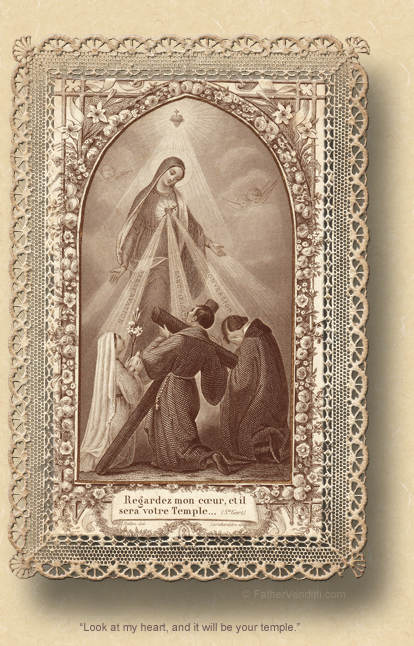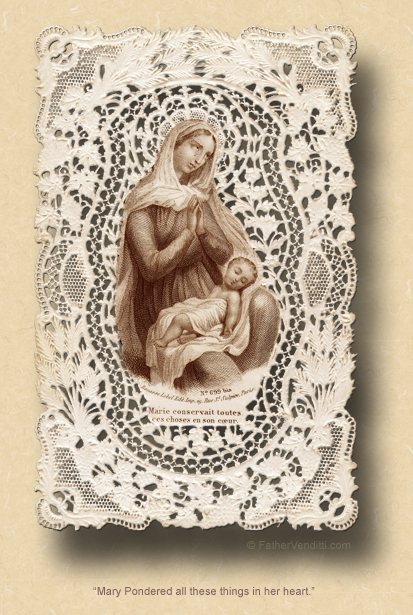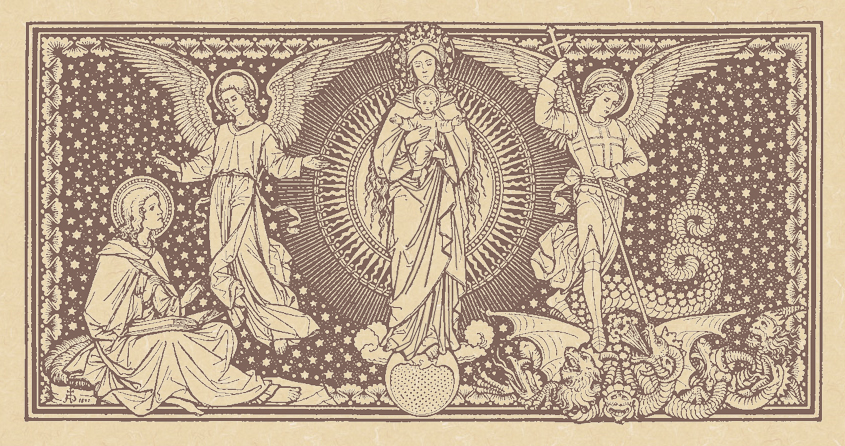She Preserved All These Words in Her Heart.
The Thirty-Fourth Saturday of Ordinary Time; or, the Saturday Memorial of the Blessed Virgin Mary.
Lessons from the proper for the Memorial of the Immaculate Heart of Mary observed as a votive, according to the ordinary form of the Roman Rite:
• Isaiah 61: 9-11.
• [Responsorial] I Samuel 2: 1, 4-8.
• Luke 2: 41-51.
|
When not altered for the votive, lessons from the primary feria:
• Daniel 7: 15-27.
• [Responsorial] Daniel 3: 82-87.
• Luke 21: 34-36.
|
|
When the Saturday Memorial of the Mother of God is taken, lessons from the feria as above, or any lessons from the common of the Blessed Virgin Mary.
|
The Third Class Feast of Saint Bibiana, Virgin & Martyr.*
Lessons from the common "Me exspectavérunt…" for a Virgin Martyr, according to the extraordinary form of the Roman Rite:
• Ecclesiasticus 51: 13-17.
• Psalm 45: 6, 5.
• Matthew 13: 44-52.
The Twenty-Fifth Saturday after Pentecost (the Third of Philip's Fast); the Feast of the Holy Prophet Habakkuk; and, the Feast of Blessed Ivan Slezyuk, Bishop of Ivano-Frankivsk.**
Lessons from the pentecostarion, according to the Ruthenian recension of the Byzantine Rite:
• Galatians 3: 8-12.
[or, Ephesians 2: 11-13.]***
• Luke 12: 32-40.
FatherVenditti.com
|
 7:04 AM 12/2/2017 — No, I did not make a mistake regarding the lessons. I deliberately chose to replace the lessons for today with those from the Memorial of the Immaculate Heart of Mary, as that is the votive Mass we are offering together today. Just as yesterday was our last First Friday of the year, so today is the last First Saturday of the year. We’ll expose the Blessed Sacrament after Holy Communion, pray together the Litany of the Immaculate Heart of Mary, I’ll return to the confessional for anyone who may have missed confessing before Mass, and we’ll conclude with Benediction at 1:30. 7:04 AM 12/2/2017 — No, I did not make a mistake regarding the lessons. I deliberately chose to replace the lessons for today with those from the Memorial of the Immaculate Heart of Mary, as that is the votive Mass we are offering together today. Just as yesterday was our last First Friday of the year, so today is the last First Saturday of the year. We’ll expose the Blessed Sacrament after Holy Communion, pray together the Litany of the Immaculate Heart of Mary, I’ll return to the confessional for anyone who may have missed confessing before Mass, and we’ll conclude with Benediction at 1:30.
“Well may I rejoice in the Lord, well may this heart triumph in my God” (Isaiah 61: 10). Those are the words of Isaiah the Prophet which we just heard in our first lesson, which I just repeated for you in Msgr. Knox's excellent translation. There is, of course, no way to know what was in the mind of the Prophet when he wrote those words, but we do know what was in the mind of God when he inspired the Prophet to write them: the Heart of which he speaks in the Heart of God's Mother, and we do rejoice in it because, in that Heart, is found the triumph of God.
Some of you may remember that this Shrine was originally named The National Blue Army Shrine of the Immaculate Heart of Mary. That was later changed to reflect the fact that our purpose here is to promote and spread the messages of the Blessed Virgin at Fatima; so, our official title now is The National Blue Army Shrine of Our Lady of Fatima Dedicated to the Immaculate Heart of Mary.
That being said, we should acknowledge that devotion to the Immaculate Heart of Mary is not as historical as that to the Sacred Heart of Jesus. Devotion to our Lady under the title of her Immaculate Heart was first preached by Saint John Eudes in the seventeenth century—I mentioned him briefly yesterday. He, of course, was the holy priest who founded the community known in France as the Eudist Fathers, what most of us refer to as the Congregation of the Sacred Hearts of Jesus and Mary. Initially, he founded his society of priests to preach devotion to the Sacred Heart of Jesus, but soon realized that it was impossible to talk about the Sacred Heart without also speaking of Mary's Immaculate Heart, for it is impossible to worship one without venerating the other. We, of course, know this instinctively: one cannot love the Son without loving the Mother, and one cannot love the Mother without loving the Son.
Those of us who love the Blessed Mother of God and who find her truest beauty in the contemplation of her Immaculate Heart, owe the greatest debt of gratitude to Saint John Eudes for being the first to promote this devotion; but, we must also give a tip of the hat to our late Holy Father, Pius XII, who, in 1942, inspired by the life and preaching of Saint John Eudes, consecrated the world to the Immaculate Heart of Mary, and who established the feast of that name which we observe every May.
It is not insignificant that today's Gospel lesson presents to us the first recorded words of Our Lord in the Gospels: “I must be about my Father's business” (Luke 2:49). Certainly, He must have spoken before this, but these words are the first recorded for us.  And the response of the Mother of God to these striking words—the first words we hear spoken by Her Son—is not to speak, but simply to keep “all these things carefully in her heart” (2: 51). The text of the Vulgate reads: Et mater ejus conservabat omnia verba hæc in corde suo—“And she preserved all these words in Her heart.” It doesn't mean simply that She remembered them;—it doesn't say She kept all these words in Her mind—it says She preserved them in Her Heart. When you keep something in mind, it means nothing more than that you remember it; it might be something good, it might be something bad. But when you keep something in your heart, it means you cherish it and nurture it; you water it and tend it like a farmer waters and tends a seed; you allow it to grow within you and feed your interior life; it finds a place in your prayers, and effects your resolutions. And the response of the Mother of God to these striking words—the first words we hear spoken by Her Son—is not to speak, but simply to keep “all these things carefully in her heart” (2: 51). The text of the Vulgate reads: Et mater ejus conservabat omnia verba hæc in corde suo—“And she preserved all these words in Her heart.” It doesn't mean simply that She remembered them;—it doesn't say She kept all these words in Her mind—it says She preserved them in Her Heart. When you keep something in mind, it means nothing more than that you remember it; it might be something good, it might be something bad. But when you keep something in your heart, it means you cherish it and nurture it; you water it and tend it like a farmer waters and tends a seed; you allow it to grow within you and feed your interior life; it finds a place in your prayers, and effects your resolutions.
And by responding this way to the very first words spoken by our Blessed Lord in the Gospel, the Immaculate Heart of Mary sets the pattern for us, and teaches us our very first lesson in how to read the Bible: we don't analyze the words of our Lord, we don't pick them apart and look for various meanings, we don't look for some creative way to pretend that our Lord is saying something we want Him to say or not saying something we don't want Him to say; we simply preserve them in our hearts, we make them part of our prayer, and thereby make them the foundation of our lives.
“Exsultavit cor meum in Domino, salvatore meo.” Our Responsorial Psalm today isn't really a psalm at all, it's from First Samuel: “My heart exults in the Lord, my Savior” (I Sam. 2: 1). In addition to all the intentions we bring to Holy Mass on this last First Saturday of the year—intentions for our country, for our families, for the triumph Her Immaculate Heart throughout the world—let us also bring the intention that we might follow the lead of the Mother of God in learning how to more perfectly follow Her Son, and, like Her, cherish His words in our hearts.

* Bibiana was martyred at Rome under Julian the Apostate in 363.
** Cf. the footnote in the post here for an explanation of Philip's Fast.
Habakkuk (or Habacuc) lived toward the end of the 7th century BC. He foretold the ruin of the Temple and the destruction of Jerusalem and, like Nahum, the punishment of Niniveh.
Blessed Ivan Slezyuk was born on January 14, 1896, at the village of Zhyvachiv, in the Ukrainian region of Stanislaviv, now called Ivano-Frankivsk. Ordained in 1923, he became Coadjutor of Stanislaviv, and was arrested by the Bolsheviks at exactly the time that his predecessor, Bishop Khomysyn, died in a prison in Kiev. Himself imprisoned and released several times, he died on this day in Stanislaviv in 1973, and was beatified by Pope Saint John Paul II on June 27th, 2001, together with 24 other Ukrainian victims of the Soviet regime.
*** The Epistle sung today is also sung on the Saturday before Christmas. While the General Typicon makes no provision for avoiding this repetition, the Typicon of the Rutheninan Church allows the singing of the Epistle for the Twenty-Ninth Saturday in it's place at the discretion of the parish priest.
|

